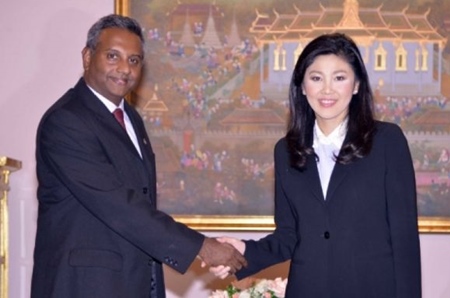BANGKOK, June 12 – Amnesty International (AI) has called on Thailand to press for human rights protection in Southeast Asia, abolish shackles among inmates and stop pushing Rohingya ethnic migrants from the kingdom.
In a meeting with Thai Prime Minister Yingluck Shinawatra on Tuesday, AI secretary general Salil Shetty handed over the 2013 report on human rights situation to the Thai leader.

Mr Shetty said Thailand should be a driving force in encouraging Southeast Asian countries to enhance human rights protection in addition to educating their peoples on the global practice.
The non-government organisation expressed appreciation for Thailand’s decision to unshackle inmates and urged the Thai government to refrain from capital punishment to show the country’s respect for human dignity and value.
Mr Shetty said Amnesty submitted an open letter to Deputy Prime Minister/Foreign Minister Surapong Tovichakchaikul on Monday, seeking human rights protection for migrant workers and Rohingya refugees in Thailand.
The organisation said the Thai government should not push Rohingya refugees’ boats to the high seas and to release the refugees to avoid breaching international laws.
The Thai government should cooperate with Southeast Asian countries in solving the Rohingya migrant problem with Myanmar, the Amnesty International secretary general said.
He said Thailand should refrain from issuing laws that restrict people’s rights and freedom of expression and should unconditionally release prisoners whose ideologies contradicted the government’s.
Ms Yingluck reportedly gave assurances that the Thai government has treated migrant workers and refugees under appropriate human rights principles.
She added that Thailand has seen positive development on capital punishment which is in accord with international laws on human rights.
Capital punishment has been reduced for delinquents below 18 years old while the punishment is prohibited against pregnant women, women with infants and mentally-unstable convicts, she said.




